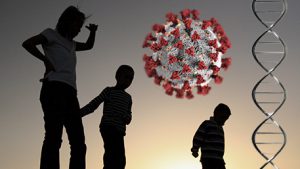 In this post, we discover how new research on rare genetic diseases helps in our understanding of the incidence and consequences of Quid -19 and discuss the potential implications of clinical and public health. Understanding the mechanism included in these inherited disorders can shed light on the natural method of biological procedures and the natural history of Coid 19.
In this post, we discover how new research on rare genetic diseases helps in our understanding of the incidence and consequences of Quid -19 and discuss the potential implications of clinical and public health. Understanding the mechanism included in these inherited disorders can shed light on the natural method of biological procedures and the natural history of Coid 19.
Primary Immunodeficiti and Covid 19
Primary immunodeficiency (PI)-often used with exceptional congenital error (IEI). By 2022, 485 different types of PI were described, which affects the various components of the immune system and results in a variety of disorders, which increases severe infections and automatic sensitivity.
In PI patients, acute covide -19 consequences have yielded contradictory results, possibly due to the size of the small sample and the basic genetic reasons. For example, a study with 67 PI patients in the UK has found a proportion of 28.5 % deaths, while another study with 20 PI patients in Israel has been reported in 0 % case. In several, small studies, some types of pies have been found to have a potential risk factor for acute covide 19 consequences. In our recent organized review of 68 studies, we calculated the total 9 % case mortality rate in PI and 459 people of Covade -19, 49 % hospital admitted, and 29 % oxygen supplementation rates.
Interferon Type 1 Exception and Congenability of Covid 19
A recent study by Casanova and Anderson concludes that Type I interferon (IFN) is 15 % of the major covid 19 pneumonia of the major covied in unrelenting and automatic flaws together. Type I IFN Signaling Pathway includes toll -like receptor 3 (TLR3) and Interferon Regulator Factor 7 (IRF7). The TLR3 works first and recognizes the double trapped viral RNA, while IRF7 is a copy factor for IFN production. Production errors of type IFN immunity due to mutation tlr3 And IRF7 Earlier, life -threatening influenza is associated with pneumonia.
A study included in the review has shown that the variations tlr3 And IRF7 Compared to patients with mild or asymmetomatic Coid -19, genes were more common in relevant routes in acute covide 19 patients. Variations in Toll -like receptor 7 (tlr7), Which is responsible for the reduction of XR TLR7 (XR TLR7), which is associated with X -connected tool -shaped tool -like receptor, was also associated with severe covide 19. This PI was not known before and was discovered during pandemic disease. The reduction of XR TLR7 was estimated to be present in 1 % major COVID-19 cases in men under 60 years of age. COVID-19 Multi-System Inflammatory Disease (MIS-C) study suggests that the type I IFN is also a role in the Mis-C sensitivity.
Automent bodies are also associated with severe covid -19 to type IFN. These autonomous bodies are estimated that they have 10 % of the severe covid 19 cases and 20 % of the death related to Covade 19.
The implications of medical and healthcare
Research on PI and severe covid -19 consequences makes it clear how the study of rare genetic causes of common diseases can provide insights on the method of diseases. Most human diseases are caused by mutual interference between many genetic and environmental factors, and there is no exemption from infectious diseases. Although a slight proportion of patients is ill due to rare, single -genes disorder, it can improve the understanding of basic biological paths, which in turn leads to new treatment that is related to the disease spectrum.


